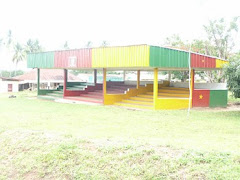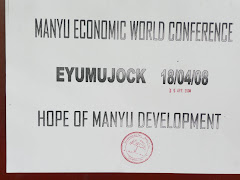
Manyu people at home and abroad need to develop a community spirit which is a prerequisite for economic empowerment. A community spirit entails working together as organized groups to realize projects or solve problems that plague our community. A community spirit suggests a sense of reciprocity, reaping from the benefits that come from working together. Empowering the people is enabling them to become self sufficient, alleviating poverty.
Poverty is a state of material, intellectual or moral destitution which prevents one from properly assuming responsibility for oneself and from integrating in the social, economic, cultural, or political life of the community or nation. Such a state can be partial or total, but never beyond remedy. Every individual must find ways and means to break away from this state.
As an individual, one can be very rich and self sufficient but if the one is surrounded by poor family members who depend solely on him; they all drift towards the poverty line. It is therefore very important for us to put our heads together, diagnose the causes and look for appropriate solutions.
The fight against poverty can be seen as a wealth generating activity undertaken by the poor or the poorest sections of the population. This means that people interested in their welfare, instead of providing them with materials goods (rice, drugs, clothing etc) for a limited period of time, it is better to teach the poor to generate their own income. Giving aid to people is just an accident, but ownership is more permanent and it leaves the whole population richer. In order to reduce poverty, in our Division, a number of issues have to be addressed.
Building a community Spirit: encouraging team work
Many of us like to work as individuals probably as a result of past experiences we have had working with other people. If your first child dies of malaria you will not stop giving birth. Working in organized groups will enable us to:
* attain economic self sufficiency faster and share the risks involved,
* have a new insight into challenges around us and stimulates the search for solutions.
* mobilize enough resources to solve our problems.
* save and invest wisely as individuals and as groups to reduce poverty.
The fight against ignorance (Education)
Creating awareness in the population of other possibilities or opportunities available to them is of primary importance.
Teaching them: various ways of production and conservation, how to plan for the future, carrying out ongoing education on programmes that lead to economic enhancement will reduce poverty and create new jobs.

The schools should therefore aim at producing an all round citizen that will adapt without self-negation to scientific and technological change, to maximize his or her chances; to be grounded in the customs of his or her environment; and to face unavoidable competition in and out of their immediate environment.
The fight against subsistence agriculture
Over 70% of our population is engaged in subsistence agriculture. We need to go beyond this and start creating large farms and estates that will be of economic importance. This can only be possible through Common Initiative Groups which can attract us other sources of finance.

This entails the implementation of a policy for the:
* Promotion of the production and processing of all types of farm products (maize,
groundnuts,
cassava, peppers, pigs, poultry, palms, coffee, cocoa etc,)
* Promotion of improved seed variety
* Promotion of the organized sale of the surplus food produced.
Promotion small scale industries This implies developing activities which enable: Transformation of raw materials;
Promotion of specialized training in the sector;
Promotion of the sale and even the exportation of the products.
The fight against basic diseases (healthcare)
This involves: Giving the underprivileged access to quality drugs; setting up specialized medical units, especially in the hinterlands; setting up specialized training institutes, developing research and creating paramedical centres.
To achieve this, there must be a total mobilization of resource from external and internal elites and most importantly from the local populations.
There is a need for appropriate microeconomic financial institutions with a good legal framework; flexible regulatory framework; fair interest rates;
Consideration of socio-cultural values; forms of the guarantees tailored to socio-cultural values and needs of the poor.
Government Policy is encouraging private initiative and more and more she is using organised groups to promote its policy as seen in law N° 92/006 of 04/08/92 and decree N° 92/455/PM of 23rd November 1992, regulating the creation of cooperatives and Common Initiative groups. The government of Cameroon and many donor organisations are now using these channels to enable people to help themselves and overcome the devastating effects of poverty. Let us like other Cameroonians encourage our population to organise themselves and get these people with charitable hearts to help us.
There has been considerable effort in the past to carry out joint ventures with various degrees of success. We have had groups like Semosengo in transportation, various Cooperative Movements, financial institutions like SSL and NIS, Credit Unions etc. We say BRAVO to our illustrious sons and daughters who started these initiatives. In spite of any past set backs, we should not give up. These should instead give us the courage to move from where they ended. The important thing is to learn from their mistakes and do better.
There have been recent efforts to mobilizing group effort to reduce poverty and more are on the way. Some individuals, Dr Christy Mbi, Mrs. Ogork Susan, Mrs. Lydia Njike, Mrs. Bertha Eta, and all the share holders with the support of some prominent elites, have taken up the challenge to come up with structures that will empower more people, bring about poverty reduction and create more jobs in Manyu Division. Two of these structures are the Manyu Integrated Farmers’ Cooperative Society (MIFCO) and The Community Bank, Mamfe (MC²)
MIFCO was registered on the 13th August 2003, under Registration N° FWI CO/02/03/36/08 at Buea with the status of a Cooperative with over 50 members comprising of groups and individuals. The head office is at the old Total filling station Mamfe Town and Mr Philip ASSEM ASSEM is the Manager.
The mission of MIFCO is to bring out the development potentials of Manyu Division in Natural and human resources to improve on the life style of the population.
In 2004 MIFCO opened a demonstration farm of plantains and maize with the aims of educating young farmers on modern farming methods and supplying improve seed variety to interested farmers.
In 2006, the Cooperative started a piggery farm and this attracted HIPC funding from the Ministry of Livestock and Animal Industry in Manyu Division.
In December 2006, MINEPIA enable us to put up a Pig Multiplication farm at Ewelle with a technical staff appointed to supervise the project in the Division and a provincial Coordinator appointed for the South West Province. A subvention of 1.5 million francs has been distributed to 16 pig framers in April 2007 to enable the farmers improve on their farms.
Achievements:
1. We have successfully sponsored the feasibility studies of the 03 project: poultry production maize production, small animal and rodents mentioned above.
We sponsored over 10 maize farmers by supplying them with the maize seeds and fertilizer in 2007.
2. We have supplied over 40 piglets to pig farmers as subvention from MINEPIA in 2008.
3. We opened our office in Mamfe town have recruited 3 attendants since December 2006. More recruitment is on the way with opening of the feed mill.
4. We have organised five training workshop for Animal breeders between 2005 and in 2008 in
Mamfe Town.
Future plans
a) We plan to regroup according to their fields of interest e.g. poultry farmers, small
ruminants and snail producers, butchers, marketing agents etc.
b) We plan to install 110 pig fatteners in all the four Sub Divisions by December 2010.
c) We plan to install an Animal Feed Processing plant by December 2008 in Mamfe town.
d) We plan to install 03 pig multiplication Centres in addition to the one in Ewelle by December
2010.
e) We plan to build 02 warehouses in Mamfe town, and EKOK by 2015. SOWEDA has
promised to build us the first warehouse in Mamfe.
f) Feasibility studies shall be order for ‘The promotion Poultry Farming in the Division with
emphasis on multiplication activities.
g) Feasibity studies shall be ordered for the Building of the first warehouse in Mamfe own
immediately funds are available to harbour our Headquarter too.
h) Capacity building Workshops shall continue to be organised as funds are available.
i) We expect the membership to increase.
Membership
Open to groups and individuals.
Registration 10.000 francs and buy at least 03 shares of 10.000 FCFA each payable within 03 months.
All that has been realised could not have been possible without the collaboration of MC². MC² finances some of the activities of MIFCO farmers by way of loans.
It is common knowledge that the people of the rural areas hardly have access to credit from the traditional banks because of lack of security. The Afriland First Bank, recognising this particular difficulty, decided to create the MC², The Community Bank, putting in place conditions which can be flexible and adapted to the conditions based on existing social structure and personal relations of confidence and trust. There are 68 MC² panted all over the nation and MC² Mamfe is one of them.

MC² is a micro rural community development micro bank created and managed by members of the community where the MC² is based. This policy of MC² respects the social, cultural and religious values of the people. MC² is technically and institutionally supported by Afriland First Bank and ADAF, Appropriate Foundation for Africa Foundation. With the New COBAC Laws each MC² is autonomous.
MC² helps the community to mobilise savings and make money available too for its members to borrow and carryout micro projects on agriculture, commerce and industrial activities and also in the social domains. This enables them to improve on their life style and of course their health.
MC² Mamfe was created in September 2000 with 156 registered members. Today we count over 800 members. The management comprises of four organs: the General Assembly, the Council of Elders, the Board of Directors and the Executive Secretariat, which handles the day to day running of the institution.
Activities
* Makes funds available for people to carry out development projects as groups or individuals.
* Transfers funds through Flash Cash within the country.
* Acting as credit agents for some financiers.
* Training of small scale entrepreneurs.
* Using technical assistance for monitoring and evaluating project.
Achievements
* MC² Mamfe has acquired a piece of land to build its headquarters in the near future.
* It has mobilised funds and given over 500 loans to the tune of 160 million francs with recovery rate of 82.5%.
* MC² is working in collaboration with different financiers like Gatsby Loan Scheme which is to promote women’s financial activities.
* SOWEDA Loan Scheme to promote animal breeding and fisheries.
* HIPC funds to promote agricultural activities.
* This money has been given as loans to the target population.
* Studies for a Multimedia centre that will at the same time enable more efficient money transfer
nationwide and abroad.
* Studies for an Elite Fund to enable individuals or groups to sponsor development projects for specific purposes.
* Continue to seek for partners that are willing to provide fund for our target population.
The doors of MC² and MIFCO are open to Manyu people at home and abroad. Join us in this empowerment process. Manyu people have great talents and natural resources, if well developed through organised groups, they can attain rapid economic empowerment and thus become a force to be reckoned with in Cameroon and the world.
PRESENTED BY MRS. OGROK SUSAN AT MEDWC EYUMOJOCK CONFERENCE




























No comments:
Post a Comment